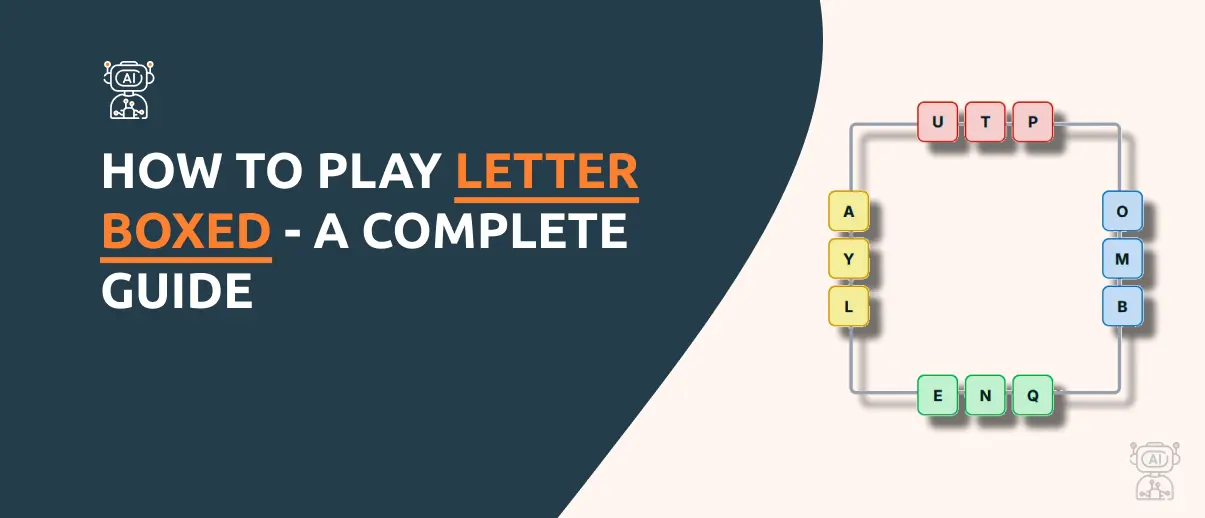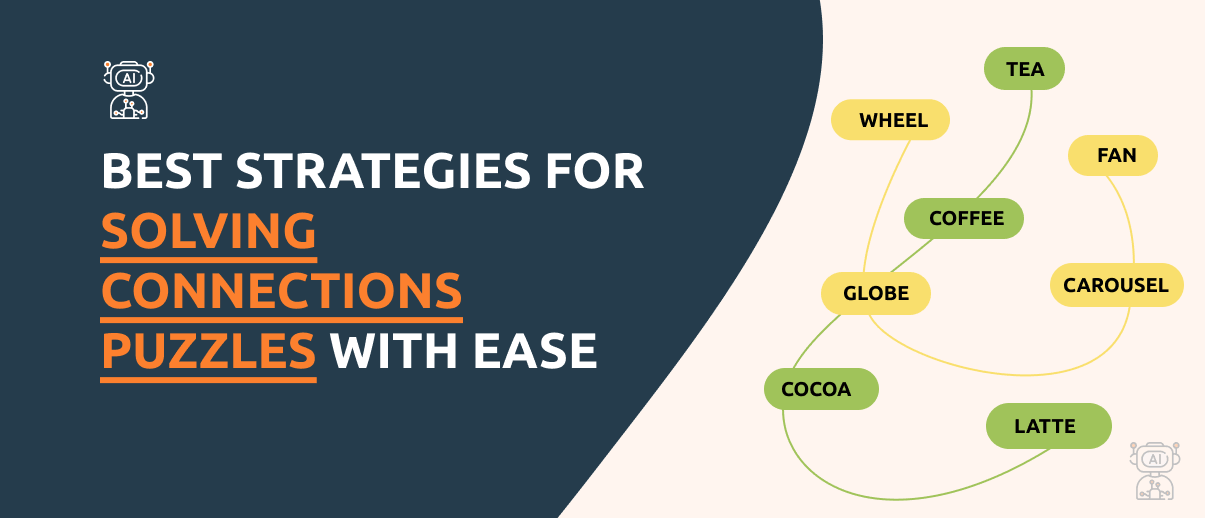A word game is a game that involves manipulating or arranging words or letters to achieve a specific goal or to create valid words. These games test players' vocabulary, spelling, and language skills, while also providing entertainment and mental stimulation. Word games can take various forms, including board games, puzzles, card games, and mobile apps.
Playing word games is more than just a way to pass the time. It is a mental workout, a creative booster, and an essential cultural activity.
These games have been very popular since the 19th century and still hold the craze in 2026. Games like Wordle, Scrabble, and Anagrams have gained a lot of attention in the past few years.
Well, that was just an overview of what word games are. To learn more about it, we recommend reading this article till the end.
Let’s dive into this!
Types of Word Games
As mentioned before, several types of word games are now available online, each testing different linguistic and cognitive skills. So, here’s a breakdown of popular types:
Crosswords:
Crosswords is a board game in which players have to fill the grid with valid words in their turn. The word can be put vertically or horizontally, but the only thing to make sure of is that the word should be valid and real.
Anagram Games:
An anagram is another type of word game in which the player gets a real word and has to rearrange its letters to form a new word. For instance, the word “LIME” could also be used as “MILE,” which is what an anagram means.
Word Search Puzzles:
The type of word game in which the player doesn’t have any clue or hint and has to find the exact word within a certain tries. One popular example of word search puzzles is NYT Wordle, which has two types: Quordle and Octordle (but neither of them is part of The New York Times).
Vocabulary Games:
Vocabulary games include a gaming interface in which you have to find the meaning of a specific word as well as its synonyms. Such games are great for enhancing vocabulary and learning new words and their definitions.
Word Scramble Games:
Scramble means a set of letters that are shuffled in a way that makes it complicated to find a word from them. The most common scramble-type games are Scrabble, Word With Friends, and Word Jumble, where you get seven scrambled letters and have to form words from them. In certain cases, people also use an online tool like Scrabble Word Finder to find a high-scoring and valid word, as their brains can’t find one.
Benefits of Playing Word Games
There are a lot of benefits that you can get from playing word games, such as they are great for cognitive improvement. So, here we are going to explore the benefits of word games.
-
Stress Relief: Word games are like stress relief and build calmness in a person. When they aren’t able to unscramble the scrambled word, they will not overreact or close the game (maybe they do). Instead, they will try to think and find a solution. That way, they are building calmness in themselves, which will lower the stress in their life.
-
Enhanced Vocabulary: As the base of word games is finding words in the game, they are a great fit for enhancing vocabulary. Especially kids can benefit from word games and learn new words each day. Moreover, for newbie writers, word games are perfect for improving their lexicon and becoming wordsmiths.
-
Boosted Memory Retention: Some people don’t know, but playing word games could also boost one’s memory retention. Just like it sharpens their thinking ability, it also hones their brain in a way that they can remember things for a long time, or they may never forget them.
-
Build Consistency: This might look irrelevant, but playing word games like Wordle, Quordle, or Jumble on a daily basis also builds consistency. For instance, if a player starts playing Wordle in their free time, it will start working as a habit whenever they get spare time; they will start finding words in the game. This leads to consistency and dedication to something that a person loves to do.
One user, @WordMaster123, shared on Instagram:
“Playing a quick game of Scrabble with friends every weekend has become our new tradition. It’s fun, social, and keeps us mentally sharp!”
Such anecdotes underscore the social and cognitive value of word games.
Best Word Games in 2026
As technology continues to evolve, the list of top word games grows. Here are some of the best word games in 2026:
Wordle
Wordle is a word-guessing puzzle in which players have to find a 5-letter word on their own by guessing random words of the same length. The game might sound soft and easy to play, but it’s not. You will get stuck at some point, thinking that only one guess is left and you haven’t found today’s Wordle answer.
It’s the product of the NYTimes, and each day, it updates with a new puzzle, and the best part is that the same answer doesn’t repeat itself. So, if you are in a situation where you can’t find the Wordle word and just one or two tries remain, using an online Wordle Solver could be an ideal option. By using such a tool, you will be able to post your today’s Wordle stats on X (Twitter) and show how complicated it was for you to solve today’s Wordle.
Scrabble & Words With Friends
Scrabble and Words With Friends are two different games with same mechanics and gameplay. Scrabble was first launched as a physical board game with a 15x15 grid, where you get a total of 225 tiles. Similarly, WWF was released in 2009 as an online game. In both of these games, you get approximately 61 special tiles, which are:
-
Double Letter (DL): There are 24 DL tiles available on the board, which could double the score of the specific letter you put on this tile.
-
Double Word (DW): There are 12 tiles of DW present in the Scrabble game, and they can double the score of the whole word if you utilize only 1 such tile.
-
Triple Letter (TL): With 17 tiles drawn on the game board, you can use any of them to triple your letter score in the game.
-
Triple Word (TW): Only 8 TW tiles are available in the game, making them the rarest ones. They can triple the score of your whole word by only using it one time.
Besides, at every turn, you will get 7 scrambled letters and have to form words from them on the Scrabble and WWF board, and that’s the trickiest part. At any place when you’re unable to find a valid yet high-scoring word while the time is ticking, then don’t be afraid to use Words With Friends Solver. It can unscramble the given letters and will provide you with a lot of high-scoring words.
Word Jumble
One of the most complicated word-making crossword games is Word Jumble. It’s an online version where players are given scrambled letters for each word and have to form the exact word while reviewing the hint image. The game also has a timer that shows how much time it took you to complete today’s Jumble puzzle.
The game could get trickier as you progress, and in the end, you also have to find the exact phrase that defines the whole image. So, by any means, if you can’t find today’s Jumble answer, try using our Jumble Solver. With it being free of cost, you can quickly find the exact word from scrambled letters and solve today’s Jumble puzzle game.
Wordscapes
Wordscapes is a mixture of crossword and word-guessing puzzles where players are given scrambled letters and have to form exact words from them. The game has several different levels, and each level offers a different board and scrambled words.
You can’t guess what’s coming next, but with the help of Wordscapes Cheat, finding the exact word by a certain length is easy and simple.
These games stand out for their engaging features, sleek design, and accessibility across platforms.
Strategies for Excelling at Word Games
Success in word games often comes down to strategy. Here are some tips to up your game:
Memorize Short Words:
In the majority of games, you can’t play short words like 2-letter words or even 3-letter words. However, in games like Scrabble, Words With Friends, and Jumble, every word is playable, even two-letter ones.
Not only that, but certain 2 letter words can double your scores in the game as they contain certain high-scoring letters. Some common short words that are valid and playable are:
-
QI has 11 points.
-
ZA has 11 points
-
ZE has 11 points.
-
ZO has 11 points.
-
XI has 9 points.
-
XU has 9 points.
-
EX has 9 points.
So, if you master these words and build a strong grip on them, they can benefit you a lot and help you outshine your opponent.
Study Common Prefixes and Suffixes:
Did you know that in Scrabble or WWF, you can extend existing words on the board by adding letters after or before them? Yes, it’s true, and it’s a great technique to get high scores without putting much effort into it. For that, you must familiarize yourself with common prefixes (such as “re-,” “un-”) and suffixes (such as “-ing,” “-ed”).
Let’s suppose “JUMP” is on the board, and you have the letters ING. By adding them before the word, you can form “JUMPING,” which gives you a total of 19 points in the game by only using 3 letters. If you are lucky and hit a special tile like Triple Word or Triple Letter, it could triple your score.
Play Regularly:
If you want to be like Dan Feyer, who can instantly find words without any help or hints, then make sure you practice on a regular basis. Practicing also helps boost vocabulary as you learn new words by forming different letters.
No matter where you are, whether in an office sipping tea or on your couch lying on your back, take 5-10 minutes to solve daily word puzzles or board puzzles.
Quotes from gaming experts, such as puzzle designer Will Shortz, emphasize practice and strategy as keys to success:
“The more you play, the more patterns you see and the faster you solve.”
Regular practice helps you recognize patterns, which can improve your skills over time.
AI Tools to Solve Word Games
If you are on the verge of solving today’s word puzzle, but your mind can’t find the word, then consider using an online tool. Using a word finder can help you find high-scoring and valid words instantly without any brainstorming.
Below are some of the best AI-driven word solvers to assist you in solving word games with ease:
AI Word Solver
The top on the list is AI Word Solver. It is an online platform offering different AI-powered word solving tools, such as Scrabble Word Finder, Wordle Solver, Letter Boxed Solver, Rhyme Finder, and many more.
It is a completely free platform that you can use without any limitations. What makes AI Word Solver the best-in-class online tool is its massive word database. It uses a list of more than 280,000 valid English words – all acceptable in the word games.
Besides, AI Word Solver offers advanced options where you can filter more thoroughly to find the exact word. For instance, if the word starts with letters like “NO,” then you can enter them in the “Start With” field and hit the “Search” button. It will provide you with words like “NOTHING,” “NOISE,” NORTURE,” and many more. Other such options available in Word Finder are:
-
Ends With – where you enter those letters that are coming at the end of the word.
-
Contains – here, you can type those letters that are present in the word.
-
Length – you can choose a certain length, and AI Word Solver will only provide the list of words of the chosen length.
Final Thoughts
Ultimately, word games are engaging ways to entertain and challenge the mind, making them a favorite pastime for many. They not only enhance vocabulary and cognitive skills, but they also foster social interaction. Enjoy the endless possibilities provided by word games and embrace their joy.
Meet the Author

Talha Zahid
CEO, AI Word Solver
Talha Zahid is the visionary CEO of AI Word Solver, a platform that leverages cutting-edge AI to revolutionize language processing. With a passion for technology and problem-solving, Talha focuses on developing AI solutions for complex word puzzles. An expert in SEO and digital strategy, he integrates content optimization into his work. Under his leadership, AI Word Solver sets new industry standards. Connect with him on LinkedIn.
OTHER SOLVER
Try out other advanced tools of AIWordSolver to become a master.



